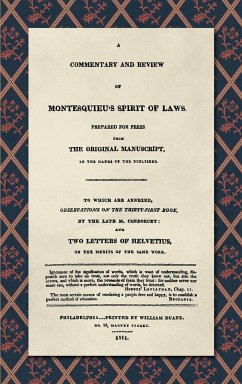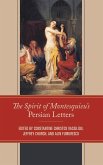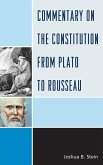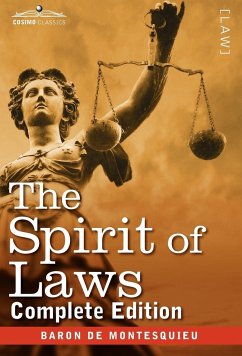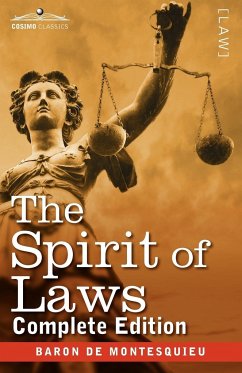Montesquieu's Spirit of the Laws (1748) is one of the most important political texts of the eighteenth century, exercising an enormous influence in both Europe and North America. Famously it was here that Montesquieu outlined his distinction between moderate and despotic governments and praised the virtues of England's monarchical constitution. In A Commentary and Review of Montesquieu's Spirit of Laws, Antoine Louis Claude Destutt de Tracy (1754-1836) criticizes Montesquieu's defense of monarchy and supports American-style republicanism operating in the context of a laissez-faire economic order. Destutt de Tracy was one of the founders of the Idéologues, a classical liberal group that included the economist Jean-Baptiste Say. Although born into an aristocratic family, he came to support the republican ideals of the French Revolution. Despite this, during the Reign of Terror, he was imprisoned and narrowly escaped execution. It was in the context of a failed revolution that Destutt de Tracy composed A Commentary and Review, following Montesquieu's Spirit of the Laws chapter by chapter, book by book, analyzing Montesquieu's distinctions about the various types of government--monarchy, democracy, aristocracy, despotism, oligarchy, and the like. He also examined Montesquieu's thoughts about education as they relate to the principles of government, civil and criminal laws and other forms of judgment, and laws that establish political liberty with relation to the constitution. Destutt de Tracy sent the completed work to Thomas Jefferson, who had it translated into English and published it in America in 1811, at a time when a French edition was impossible due to the censorship imposed by the Napoleonic regime. In a letter to Destutt de Tracy dated January 26, 1811, Jefferson wrote that the need for the critique of Montesquieu's work "is now supplied, and with a depth of thought, precision of idea, of language and of logic, which will force conviction into every mind. I declare to you, Sir, in the spirit of truth and sincerity, that I consider it the most precious gift the present age has received." Destutt de Tracy believed that the goal of every citizen should be a representative democracy that spreads information, promotes commerce, and extols liberty and equality. In Commentary and Review, he consistently applies logic and clear, concise analysis in his criticism of Montesquieu's work, and the result is a thought-provoking examination of the proper role of government. Volume editor Jeremy Jennings has provided a thoughtful introduction and annotations with additional information relating to Destutt de Tracy's references to historical figures, events, and literary sources.
Hinweis: Dieser Artikel kann nur an eine deutsche Lieferadresse ausgeliefert werden.
Hinweis: Dieser Artikel kann nur an eine deutsche Lieferadresse ausgeliefert werden.


